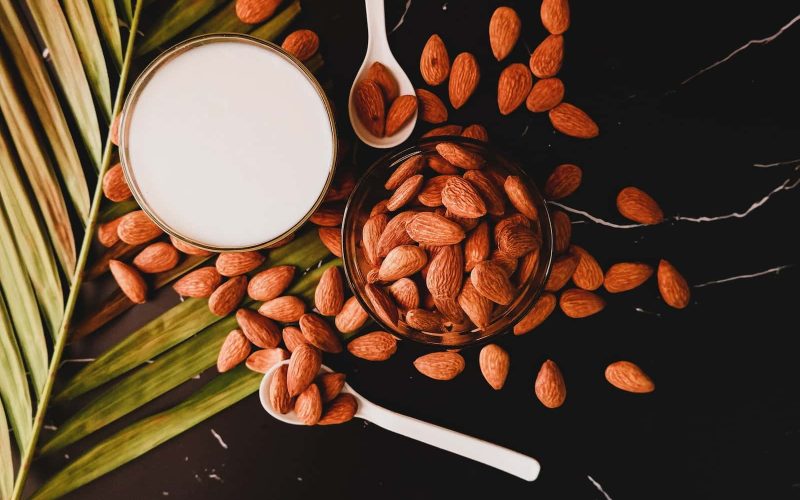We all know that calcium is an essential part of a healthy diet. Are you aware of calcium sources in food and the daily amount required to meet your needs?
Calcium helps form and strengthen teeth and bones, produces hormones that regulate blood pressure, and has functions in providing neurological protection.
It’s recommended to get 1,000 mg of calcium each day for adults between 19-50 years old, though this number can vary depending on age, gender, and lifestyle.
Dairy products are widely considered the top source of dietary calcium, but there are plenty of other food sources.
While dairy products such as milk, cheese, and yogurt provide significant calcium sources of food.
There are many other foods high in bone-building minerals equally as nutritious that can supplement the typical Westernized diet now consumed by most people.
Our article will discuss the various calcium sources of food available in plant-based and omnivore-style diets.
1. Rhubarb
Rhubarb is first on our list of calcium sources of food. It’s a valuable source of calcium in the diet, providing about 128 mg per cup.
Calcium is an important mineral for human health. Its roles include maintaining healthy bones and teeth, aiding muscle contraction and nerve transmission, regulating heart rate and blood pressure, and forming clots necessary to stop bleeding.
Rhubarb also provides some magnesium which is beneficial for digestion and helps to regulate blood pressure levels.
In addition, rhubarb contains both vitamin C and dietary fiber; vitamin C benefits our immune system, while dietary fiber improves digestion by adding bulk to stools.
Furthermore, when cooked into recipes like tarts or jams, rhubarb adds sweetness with a tart aftertaste making it a great way to enjoy the benefits of added calcium without compromising on taste too much!
2. Amaranth
Amaranth is also on our list of calcium sources of food. It s a powerhouse of essential minerals and nutritional compounds, especially regarding calcium.
Amaranth provides the body with a large dose of calcium and is also one of the most easily accessible sources of calcium.
One cup of cooked amaranth contains about 302 milligrams of calcium, making it incredibly easy to gain an adequate daily intake from this common grain.
Furthermore, consuming amaranth as a calcium source assists in absorbing other minerals, such as magnesium and iron, that support overall health.
Therefore, if looking for calcium sources of food and a natural supply of organic calcium, amaranth grains are an excellent choice both nutritionally and financially.
3. Edamame and Tofu
Edamame and tofu are excellent calcium sources of food. Edamame is a type of immature soybean, often served in its pod. It can be boiled, salted, and eaten as an appetizer or side dish.
Tofu is a block of coagulated soybean curd made from soymilk. It has a soft texture and mild flavor, making it ideal for savory dishes like salads, sandwiches, stir-fries, and soups.
Both edamame and tofu are low in calories but packed with essential nutrients like calcium.
Edamame provides around 88 mg per cup, and tofu contains up to 354 mg per cup, about 35% of the daily recommended intake for the average adult.
Eating these calcium sources of food can help you meet your daily needs for adequate calcium consumption and stay healthy.
4. Fortified drinks
Fortified drinks can be a great source of calcium, which is essential for strong bones and teeth. Calcium also supports muscle, nerve, and blood vessel functioning.
Fortified drinks such as milk, almond milk, and orange juice commonly found on grocery store shelves are either enriched with calcium carbonate or contain added vitamin D, which helps the body absorb more calcium.
When choosing a fortified drink, it’s important to read nutrition labels to ensure you get sufficient amounts of calcium in your daily diet.
Depending on the brand, you may need between 8-12 ounces daily for optimal calcium intake. Suppose none of those calcium food sources fit into your dietary plan.
In that case, plenty of other fortified calcium sources of food, like yogurt, offer an equivalent amount of calcium in an easier format.
5. Figs
Figs are an excellent source of calcium. Not only do they contain a good amount, but it is also easily absorbable by the body.
Figs boast high amounts of calcium, which helps combat bone problems and deficiencies in the body.
Calcium helps form strong bones and aids in preventing osteoporosis, joint pain, and other bone illnesses.
Figs also contain essential vitamins and minerals like magnesium, potassium, zinc, iron, and phosphorus.
Additionally, they are calcium sources of food of fiber and antioxidants that help to boost the immune system and lower cholesterol levels.
These health benefits make eating figs beneficial for overall health and wellness.
The fiber in them helps promote regularity while regulating blood sugar levels. These benefits make figs perfect calcium sources of food or addition to your daily diet for optimal health.
6. Leafy Greens
Leafy greens are important calcium sources of food, a mineral that helps build and maintain bone strength.
Consuming one to two servings of leafy greens daily is beneficial for adults and children in increasing their daily intake of this important mineral.
Leafy greens such as spinach, kale, collards, Swiss chard, Brussels sprouts, bok choi, and watercress contain high levels of calcium that can help keep bones strong and healthy over time.
Leafy green vegetables are also full of fiber and antioxidants, contributing to essential health benefits.
Furthermore, these nutrient-dense calcium food sources have several other vitamins and minerals, including vitamin K, iron, and magnesium, for added benefit.
By incorporating leafy greens into our diet regularly, we can reap the rewards of a healthier lifestyle with improved well-being by helping to prevent certain disorders that a lack of calcium intake or an imbalanced diet may cause.
7. Whey Protein
Whey protein is next on our list of calcium sources of food. It is an excellent source of calcium, an important mineral for our bones and muscles.
It’s also a great supplement for building muscle or losing weight.
Whey protein contains amino acids that help your body build, repair and maintain muscle tissue.
In addition, these calcium sources of food can provide the necessary fuel needed to support physical activity and improve overall performance.
Calcium helps strengthen our bones, reduces the risk of osteopenia (a condition caused by loss of bone density), and increases bone resorption.
Whey protein is a complete source of all essential amino acids, making it easier to absorb into the body than many other sources.
Furthermore, whey’s enzyme-rich content helps our bodies break down proteins more efficiently, meaning fewer calories are burned when digesting this protein type than in other forms.
Overall, whey protein is an excellent and versatile source of calcium that provides numerous benefits, such as increased muscle mass and strength, better exercise recovery, and healthier bones.
8. Almonds
Almonds are one of the most nutritious calcium sources of food to get your daily dose of calcium.
They contain over 7 mg of calcium per ounce, providing more than 10 percent of your recommended daily intake.
Although almonds aren’t as high in calcium as other nuts, they are still a great source due to their portability.
Almonds can be eaten raw or roasted, making easy additions to salads, yogurt, and ice cream.
Furthermore, almond butter is among the delicious and healthy calcium sources of food to some other nut butter due to its high content of minerals, including magnesium, iron, and zinc.
Combined with fiber and fat content, almonds are a nutrient-dense food that provides energy and essential calcium for strong bones and teeth.
9. Beans and Lentils
Beans and lentils are excellent calcium sources of food in plant-based diets as various other minerals and vitamins.
A single cup of cooked beans or lentils can provide 20-35% of the recommended daily value for calcium. This makes them an incredibly versatile addition to any meal.
Kidney beans, white beans, black beans, chickpeas, and navy or pinto beans are all examples of legumes that are great sources of calcium. Lentils also contain a lot of calcium, especially green ones, which can easily contribute to your daily needs.
Additionally, this is especially beneficial because legumes provide essential nutrients like protein and dietary fiber that are important for maintaining good health.
Adding calcium sources of food legumes to your meals daily will ensure you get enough calcium as part of a nutrient-dense diet.
10. Sardines
Sardines, or Clupeidae, are small fish belonging to the herring family. They are a popular source of calcium, with just one can providing up to 23% of your daily needs.
Sardines are also abundant in key vitamins and minerals, including iron, magnesium, and phosphorus, helping you meet your macro-nutrient requirements.
Additionally, they pack a powerful punch of Omega-3 fatty acids essential for healthy cognitive functioning!
The convenient and affordable canned variety allows you to take these nutritious fish on the go, ideal for quick snacks or adding more nutrients to an existing dish.
These calcium sources of food are highly versatile and adaptable, so as long as you opt for quality processed brands, you can enjoy their benefits year-round!
11. Salmon
Salmon is an excellent source of calcium, providing a single serving with more than 15% of the daily recommended intake.
Not only is it rich in calcium, but salmon also contains other essential vitamins and minerals, such as iron and zinc.
Salmon is especially high in omega-3 fatty acids, which help reduce inflammation and improve overall health.
Additionally, salmon is relatively low in calories compared to its relative nutritional value.
Eating calcium sources of food can help you maintain strong bones and teeth by helping your body absorb calcium.
Because salmon is so rich in important nutrients like calcium, vitamin D, and protein, eating it regularly can support healthy bones and teeth and improve overall well-being.
12. Yogurt
Yogurt is a delicious and healthy snack with calcium, essential for strong bones, teeth, and muscles.
Not only does it taste amazing, but yogurt can also conveniently provide about 20% of the daily value of calcium in just one cup.
It contains essential vitamins such as A and B12 and potassium, zinc, phosphorus, and magnesium.
Low-fat varieties are especially beneficial as they are low in fat while providing calcium content and protecting the body from disease.
In addition, yogurt contains probiotics or beneficial bacteria that are great for our gut health, digestion, and immunity.
Due to all these benefits, yogurt has become an increasingly popular food choice, helping people stay strong, healthy, and active.
13. Cheese
Cheese is one of the oldest processed calcium sources of food known to man and a popular dairy product.
It has abundant calcium content, which is important for bone health and body development.
Cheese is also high in protein, vitamin A, phosphorus, and zinc.
The saturated fat content varies widely depending on the type of cheese (e.g., cheddar contains more than ricotta), so you should always watch your calorie intake.
Cheese also contains important fatty acids that are essential for good overall health.
Eating various types of cheeses every day will help you get at least 30% of your recommended daily allowance of calcium from food sources alone.
Furthermore, adding cheese to your diet can help reduce cholesterol levels, prevent osteoporosis, reduce cardiovascular disease risk and improve digestion.
Eating cheese in moderation as part of a healthy and balanced diet can provide all the essential nutrients for healthy growth, strong bones, and a robust immune system.
14. Seeds
Seeds are often overlooked as a good source of calcium, but they provide ample amounts of this essential nutrition.
For added nutrition, sesame, sunflower, and pumpkin seeds can be eaten in salads or tossed into your favorite dishes.
Seeds are also high in magnesium, iron, and vitamins. Eating a handful of seeds each day is an easy way to get your daily calcium requirement without overloading on sodium or fat.
Not to mention consuming seeds can help keep you active during the day with their balanced amounts of energy-providing carbohydrates!
15. Milk
Milk is last on our list of calcium sources of food and one of the best sources of calcium available, with approximately 300mg in every cup.
Getting enough calcium in our diets is important because it helps build and strengthen bones, teeth, and muscles, as well as aiding nerve communication throughout the body.
Milk contains a special type of protein called casein, making it easier for the body to absorb calcium.
In addition to its high calcium content, calcium sources of food also provide proteins, vitamins D and A – essential for bone health – and other nutrients like zinc, phosphorus, and magnesium.
It’s a low-calorie drink that can be added to meals or enjoyed as a nutritious snack.
Milk is an efficient way to get your daily dose of calcium since just one serving can provide over a third of the recommended intake for adults.
Conclusion
Calcium is an essential mineral for our bodies.
It plays a role in many bodily functions, from helping keep our bones, teeth, and muscles strong to enable us to communicate effectively with our brain.
Calcium food sources include dairy products, seafood such as salmon and sardines, green leafy vegetables like kale, legumes such as chickpeas and white beans, and fortified products like orange juice and tofu.
Calcium supplements can also be taken to ensure adequate mineral levels are maintained.
Furthermore, individuals should speak with their healthcare professional before taking any supportive measures or calcium sources of food to ensure their needs are adequately met.








